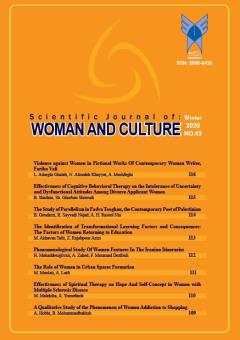The Identification of Transformational Learning Factors and Consequences: The Factors of Women Returning to Education
Subject Areas : PsychologyMahnaz Akhavantfte 1 , Zahra Rajabpour Azizi 2
1 - Alzahra University in Tehran, Department of Educational Psychology, Tehran, Iran.
2 - Alzahra University in Tehran, Department of Educational Psychology, Tehran, Iran.
Keywords: Transformative Learning, Return factors to Education, Women,
Abstract :
The purpose of this study was to identify the factors and consequences of women's returning to education in Ghaemshahr. The study population was adult female undergraduate students in the city. Fifteen adult female students from Farvardin University of Ghaemshahr were selected using convince sampling procedure over 36 years old. The qualitative research approach was phenomenological. Data were collected through semi-structured interviews and coded then analyzed using content analysis. The analysis of the data showed that various factors played roles in shaping the transformative learning in women. The most important potential influences were shown to be the devoid of feeling, the death of a beloved, engagement in a relationship, divorce, and job loss. Five factors of mental health, family, achievement goals, financial security, and obtaining an educational degree were identified to be the reasons for the entry of adult women into higher education. In addition, according to the results of this study, four themes of growth of critical thinking, cultural change, affections, and spirituality were identified as transformational learning outcomes in this study.
- اخوان تفتی، مهناز. (1382). پیامدهای طلاق در گذار از مراحل آن. مطالعات زنان، 1(3)، 152-125.
- جارویس، پیتر. (2004). آموزش بزرگسالان و آموزش مداوم. ترجمه غلامعلی سرمد. (1393). تهران: سمت.
- شفیعی، ناهید. (1388). مبانی آموزش بزرگسالان. اسلامشهر: دانشگاه آزاد اسلامی.
- رحمانی، جبار و طیبینیاء، مهری. (1397). فرایند تحول هویت اجتماعی زنان در تجربه گفتمانی نهاد دانشگاه. ( مورد مطالعه زنان متاهل، شاغل و دانشجو). جامعهشناسی نهادهای اجتماعی، 5(11)، 151-123.
- قانعی راد، محمدامین و خسرو خاور، فرهاد. (1385). نگاهی به عوامل فرهنگی افزایش ورود دختران به دانشگاهها. پژوهش زنان، 2(4)، 138-115.
- کرسول، پلانوکلارک. (2007). روشهای پژوهش ترکیبی. ترجمه علیرضا کیامنش و جاوید سرایی. (1394). تهران: آییژ.
- کرسول، پلانوکلارک. (2009). طرح پژوهش (رویکردهای کمی، کیفی و ترکیبی). ترجمه حسن دانایی فرد و علی صالحی. (1391). تهران: کتاب مهربان.
- Babacan, A., Babacan, H., (2015). A transformative approach to work integrated learning in legal education. Education & Training, 57(2), 170-183.
- Bierema, L. (2003). The role of gender consciousness in challenging patriarchy. International Journal of Lifelong Education, 22(1), 3-12.
- Cohen, J. (2004). Late for school: stories of transformation in an adult education program. Journal of transformative education, 2(3), 242-252.
- Clavert, .M (2018). Academics’ transformative learning at the interfaces of pedagogical and discipline-specific communities. Doctoral dissertation, University of Helsinki.
- Dirkx, J.M., Mezirow, J., & Cranton, P. (2006). Musings and reflections on the meaning, context, and process of transformative learning: A dialogue between John M. Dirkx and Jack Mezirow". Journal of Transformative Education, 4(2), 123-139.
- Illeirs, k. (2018). Contemporary theories of learning, Newyork, NY, Routldge.
- Jones, P. (2016). Shift happens: transformative learning in social work education. Doctoral dissertation, University of James Cook.
- Kumi Yeboah, A. (2012). Factors that Promote Transformative Learning Experiences of International Graduat-Level learners. Graduate Theses and Dissertations, University of South Florida.
- Christie, M., Carey, M., Robertson, A., Grainger, P. (2015). Putting transformative learning theory into practice. Australian Journal of Adult Learning, 55(1), 11-30.
- Moon, P. J. (2011). Bereaved elders: Transformative learning in late life. Adult education quarterly, 61(1), 22-39.
- Mezirow, J. (2003). Transformative learning as discourse. Journal of Transformative Education, 1(1), 58-63.
- Nogueiras, G., Iborra, A., & Kunnen, S. E. (2019). Experiencing transformative learning in a counseling masters’ course: A process-oriented case study with a focus on the emotional experience. Journal of Transformative Education, 17(1), 71-95.
- Liodaki, N., & Karalis, T. (2013). Educational experiences and Transformative Learning in Higher Education in Greece: a case study with student teachers. International Journal of Education, 5(2), 75-85.
- Ritz, A. A. (2010). International students and transformative learning in a multicultural formal educational context. Educational Forum, 74(2), 158-166.
- Sands, D., & Tennant, M. (2010). Transformative learning in the context of suicide bereavement. Adult Education Quarterly, 60(2), 99-121.
- Timmer. D. (2015). How to stimulate Transformative Learning? Faculty of Behavioural, Management and Social sciences. Bachelor's thesis, University of Twente.
- Vogelsang, M. R. (1993). Transformative experiences of female adult students. Theses and Dissertations,Iowa State University.
- Vittoria P., Strollo M.R., Brock S., Romano A. (2014). Survey as praxis: a pilot study on transformative learning assessment with the laboratory experience of the Theatre of the Oppressed. INTED 2014 Proceedings, 8th International Technology, Education and Development Conference. Valencia (Spain), 10th- 12th of March 2014.
- Whitelaw, C., Sears, M., & Campbell, K. (2004). Transformative learning in a faculty professional development context. Journal of transformative education, 2(1), 9-27.
_||_

